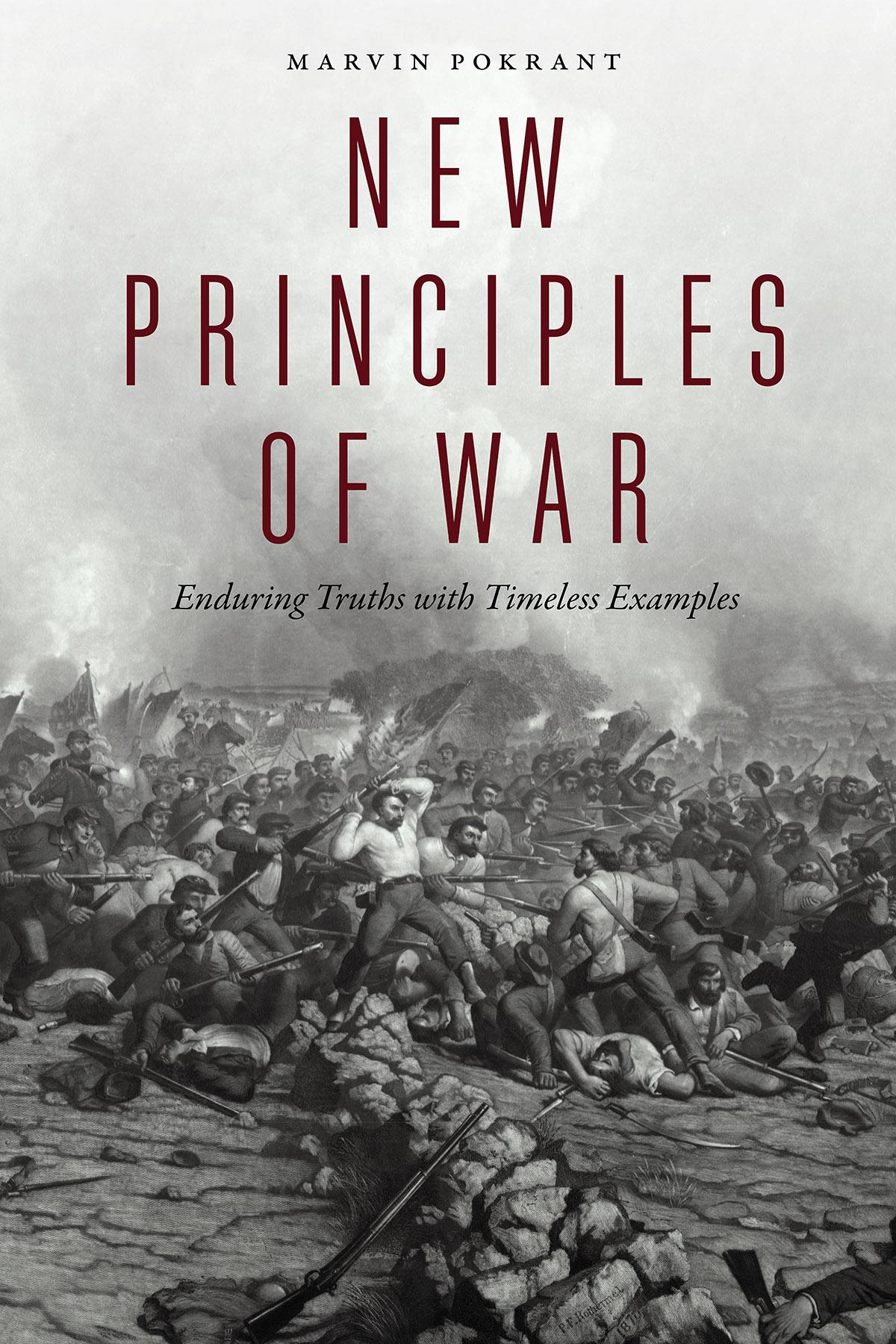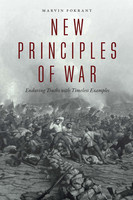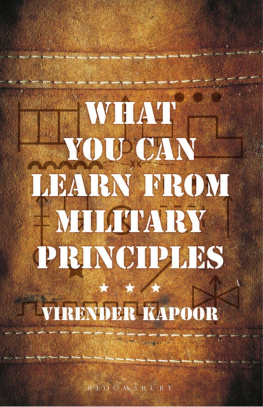
This is a fascinating book most useful for the practitioner and student of war, with many ideas also applicable to other competitive activities such as business. Marvin Pokrant gives us multiple historical vignettes that illustrate the good and the bad of principles of war from around the world and make a compelling case for significant revisions. Highly recommended!
Col. John A. Warden III, U.S. Air Force (Ret.), and president of Venturist, Inc.
Marvin Pokrant has masterfully distilled historical and international writings about the conduct of war and uses many historical examples to develop his new principles of war. I believe they form an important resource for study by both the professional military and our national security leadership.
Adm. Henry H. Mauz Jr., U.S. Navy (Ret.)
The principles of war: prescription for battlefield success or dangerous mental straitjacket? Marvin Pokrants seminal exploration of the fundamentals of warfare that have been taught around the globe for generations is sure to engage and provoke. And in these dangerous times we need to rigorously challenge our preconceptions. This book does just that.
Sean M. Maloney, PhD, professor of history at the Royal Military College
As the U.S. military refocuses on great-power competition, it must update as necessary the hoary canons of the past. Marvin Pokrant takes on this task superbly in his comprehensive, timely, and highly readable reexamination of the principles of war.
Capt. Peter M. Swartz, U.S. Navy (Ret.), senior CNA strategy analyst and former U.S. Navy maritime strategist and counterinsurgency advisor and instructor
Pokrant makes an excellent case for a new set of principles of war. Everyone that deals in the world of war plans needs this in their reference library. Rich in historical examples to support his case.
Adm. Stan Arthur, U.S. Navy (Ret.)
An important book for all who seek to understand how to improve the odds of winning our nations wars. Marvin Pokrant develops his new, more useful principles of war through the effective application of history, treating history as data to test existing and proposed principles against. I have incorporated both his principles and his methods into my course on wargaming.
Col. Matthew B. Caffrey Jr., U.S. Air Force (Ret.), author of On Wargaming: How Wargames Have Shaped History and How They May Shape the Future
All active-duty military officers should read this book. It would be perfect as a text at military war colleges. People dealing with strategic studies and national security will find this book valuable due to its suggestions of new principles to guide American military efforts. Readers of military history will find this work interesting because of the numerous historical examples.
Phil E. DePoy, PhD, former president of the Center for Naval Analyses and founding director of the Wayne E. Meyer Institute for Systems Engineering, Naval Postgraduate School
Marvin Pokrants New Principles of War is an excellent examination of the development of the principles of war throughout history and how they have differed over time and among countries.... If you are a student of military thought, this work is a must-read and will be a welcome addition to your library.
Michael A. Palmer, PhD, author of Command at Sea: Naval Command and Control since the Sixteenth Century
Marvin Pokrant is a brilliant military analyst. New Principles of War is a must-read for any student of the art of war. In fact, Pokrants concise and straightforward approach will also benefit non-military business executives as they pursue the study of the art of business!
Vice. Adm. Cutler Dawson, U.S. Navy (Ret.), and former CEO of the Navy Federal Credit Union
New Principles of War is an example of the power that can result from combining the skills of military analysis with the skillsand tasksmore often associated with the military historian. Both communities will benefit from the insights the author derived from his research and deep thinking.
Peter Perla, PhD, author of The Art of Wargaming
New Principles of War
Enduring Truths with Timeless Examples
Marvin Pokrant
Potomac Books
An imprint of the University of Nebraska Press
2021 by Marvin Pokrant
Cover designed by University of Nebraska Press; cover image courtesy Library of Congress Prints and Photographs Division.
All rights reserved. Potomac Books is an imprint of the University of Nebraska Press.
Library of Congress Cataloging-in-Publication Data
Names: Pokrant, Marvin, 1943, author.
Title: New principles of war: enduring truths with timeless examples / Marvin Pokrant.
Description: [Lincoln, Nebraska]: Potomac Books, An imprint of the University of Nebraska Press, [2021] | Includes bibliographical references and index.
Identifiers: LCCN 2020038246
ISBN 9781640122222 (paperback)
ISBN 9781640124592 (epub)
ISBN 9781640124615 (pdf)
Subjects: LCSH : War (Philosophy) | WarHistory. | Military history, Modern.
Classification: LCC U 21.2 . P 565 2021 | DDC 355.0201dc23
LC record available at https://lccn.loc.gov/2020038246
The publisher does not have any control over and does not assume any responsibility for author or third-party websites or their content.
It is a very difficult task to construct a scientific theory for the art of war, and so many attempts have failed that most people say it is impossible, since it deals with matters that no permanent law can provide for. One would agree, and abandon the attempt, were it not for the obvious fact that a whole range of propositions can be demonstrated without difficulty.
Clausewitz, On War
Contents
Fools never learn. Sensible people learn from their mistakes. Wise people learn from the mistakes of others. The wisest of all learn from both the successes and failures of other people.
Anonymous
How does a potential military leader learn the art of war? No one is born with the skills and knowledge to be a great military leader. People have to learn somehow. We can divide the way people learn to wage war into five categories:
- Their own experience in war.
- Mentors: that is, the experience of a few living people.
- Military history: that is, the experience of many people, living and dead.
- Exercises, simulations, wargames, and analyses.
- Indirect means such as studying psychology or playing games of strategy.
Ones own experience in war is the most vivid teacher. For instance, many American officers who served in the Vietnam War as lower-level officers saw many mistakes made and vowed never to repeat those mistakes when they achieved high rank. These men led the U.S. Army, Air Force, Marine Corps, and Navy in the first Gulf War, Operation Desert Storm, and changed the U.S. military into the high-morale, effective fighting force that won that war.
Although ones own experiences are extremely influential, that is not necessarily the best way to learn. People generally learn more from failure than they learn from success. From a personal growth point of view, learning from failure is good, but from a results perspective, it is better to learn before failing.
The process of learning from mentors draws on the experiences of multiple people and is the second most vivid way to gain knowledge. Learning from the experiences of a few people is certainly better than learning from the experiences of a single person. However, we can do even better. Reading military history greatly expands the list of mentors from whom we can learn. How else could we ever have the opportunity to learn from Alexander the Great, Hannibal, Scipio Africanus, Julius Caesar, Napoleon Bonaparte, Horatio Nelson, and Robert E. Lee? Napoleon claimed that the only way to master the art of war was to study the campaigns of the great generals of the past.
Next page










